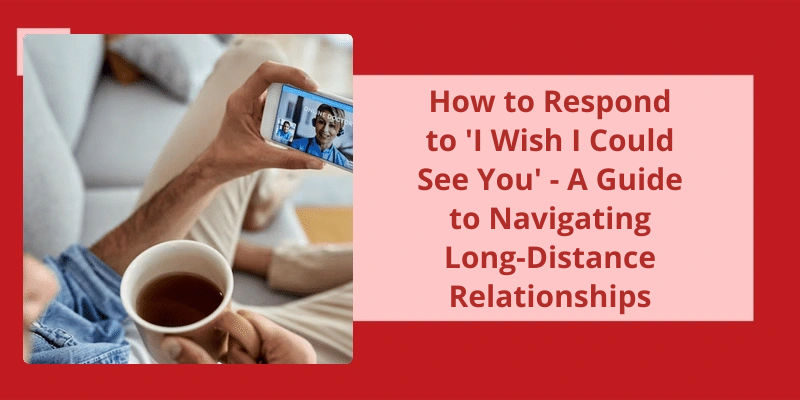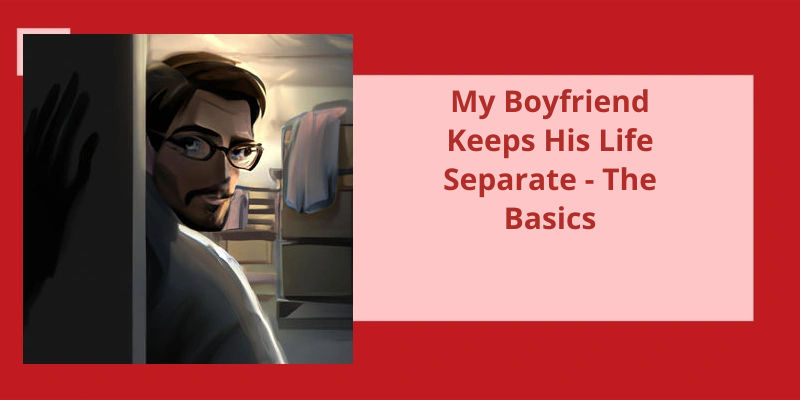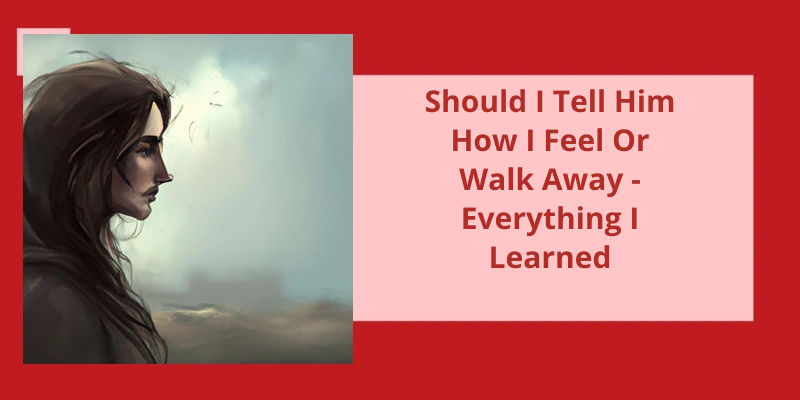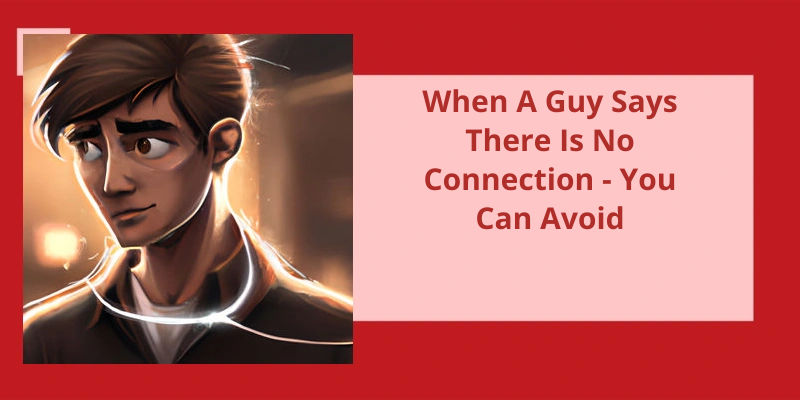As humans, we all crave connection and closeness with others, and one of the ways this desire for connection manifests is through the desire to see those we care about. When someone says "I wish I could see you," it can evoke a range of emotions and reactions, depending on the context and the relationship. It's important to take the time to understand the underlying motivations behind the statement and respond appropriately. Whether it's a friend who lives far away, a loved one who’s going through a difficult time, or a colleague expressing their admiration, there are various ways to respond to this statement that can help strengthen relationships and foster a deeper sense of connection. In this article, we'll explore some tips and strategies for responding to "I wish I could see you" with empathy, warmth, and sensitivity.
What Does I Wish You Could Be Here Mean?
When someone says “I wish you could be here,” they’re conveying a sense of longing for the persons company. This expression is often used in situations where distance or other obstacles prevent the person from being present. The speaker may be attending an event or experiencing something that they feel would be greatly enhanced if the other person were there to share it with them.
It’s a phrase that conveys a range of emotions, from sadness to hopefulness, as the speaker recognizes the barriers that stand between them and the other person. The use of “could” also implies a certain level of uncertainty or possibility, suggesting that the speaker would be thrilled if the other person were somehow able to join them.
It can be a powerful expression of love, longing, and hope for a better future together. If you hear this phrase from someone you care about, it’s important to acknowledge the depth of feeling behind it and to explore ways to strengthen your connection despite any obstacles that may be in your way.
Whether the barrier is physical distance, work obligations, or something else altogether, the speaker is acknowledging their deep desire to be with the other person and inviting them to share in their experiences, no matter how far apart they may be. If you hear this phrase from someone in your life, take it as a sign of their deep love and care for you, and consider ways to strengthen your bond, no matter the obstacles.
Different Cultural Connotations or Translations of the Phrase “I Wish You Could Be Here”
- “Ich wünschte, du könntest hier sein” (German)
- “Je voudrais que tu sois ici” (French)
- “Desearía que pudieras estar aquí” (Spanish)
- “我希望你在这里” (Mandarin Chinese)
- “あなたがここにいてくれたらいいのに” (Japanese)
- “나는 네가 여기에 있었으면 좋겠다” (Korean)
- “Я бы хотел, чтобы ты был здесь” (Russian)
Communication in relationships can often be filled with hidden meanings that one might not understand at first glance. This is particularly true when it comes to messages sent between two people. One such message that might leave you wondering is the phrase “I wish you were here.” Let’s delve deeper and uncover what this phrase truly means when someone sends it to you.
What Does It Mean When a Guy Says I Wish You Were Here?
It could also mean that they might be feeling lonely, and they crave the comfort of your company. Hearing such words from someone can be an indication of a strong emotional connection between two people.
When a guy says “I wish you were here,” it might also mean that he’s missing you deeply. Maybe he’s been thinking about you all day, and he wants to share his experiences with you by having you there next to him. It might also be a way of showing that he values your opinions and values your presence in his life.
However, it’s important to not jump to conclusions when you receive such a message. It’s important to clarify the context of the message and the intention behind it. Sometimes, people might say such things out of habit without realizing the impact it could have on the other person.
It’s a statement that expresses how much that person desires your presence in their life. It’s confirmation that you’re valued, wanted, and appreciated.
So, if someone says “I wish you were here” to you, take it as a compliment and an expression of deep care. Cherish the moment, and if you can, be there to share your presence with them. It’s an opportunity to deepen the emotional bonds that you share and strengthen the relationship.
How to Respond When Someone Says “I Wish You Were Here”
If someone says “I wish you were here”, you can respond by saying something like “I wish I was there too” or “I wish we could be together right now”. You could also express your feelings about missing them or offer to make plans to see each other in the future.
When it comes to expressing our desires and hopes, it’s important to use the correct grammar and verb tense. Many people often wonder whether they should say “I wish I can” or “I wish I could.” The answer can be a bit tricky as it depends on the context and the likelihood of the wish coming true. Let’s take a closer look at the difference between these two phrases.
Do We Say I Wish I Can or I Wish I Could?
Using “can” instead of “could” might imply that the wish is possible to achieve, whereas “could” indicates that the wish isn’t possible or unlikely to happen. Therefore, it’s more grammatically correct to use “I wish I could” instead of “I wish I can.”
For instance, if you’re expressing a desire to do something in the past that you were unable to do, you’d use “could” instead of “can.”
The use of “could” is also more appropriate when expressing a desire or request for someone else to do something. For example, “I wish she could help me with this project” is more polite than “I wish she can help me.”. The former indicates the speakers understanding that the other person may be unable to help, while the latter can come across as entitled or presumptuous.
Overall, it’s important to use correct grammar when expressing desires and wishes, as it can affect how the statement is perceived. Using “could” instead of “can” shows a greater understanding of language and social nuances, and can help you communicate your desires more effectively.
In addition, using correct grammar and proper language usage can also affect how intelligent and knowledgeable someone is perceived.
This grammatical correction can show a greater understanding of language and social nuances, and can help the speaker communicate their desires more effectively, while also showcasing their intelligence and knowledge of proper language usage.
The History and Evolution of the Usage of “Could” and “Can” in Expressing Wishes and Desires.
- The usage of “could” and “can” in expressing wishes and desires can be traced back to the Middle English period.
- In Middle English, “could” was commonly used to express a hypothetical and uncertain outcome.
- During the Early Modern English period, “could” began to be used more frequently to express a polite request or suggestion.
- By the 18th century, “can” began to be used interchangeably with “could” in expressing wishes and desires.
- Today, both “can” and “could” are commonly used to express desires, with “could” often used in more formal or polite situations.
Source: “I hope I can” vs “I wish I could” proper usage
When someone expresses their troubles or issues to another person, it’s often met with empathetic responses such as, “I’m sorry to hear that” or “That’s really tough.” However, one response that may come up is “I wish I could help.” While it may seem like a kind and caring remark, what does it truly mean? In most cases, it indicates the person doesn’t have an immediate solution to the problem, but they truly wish they could assist in some way.
What Does I Wish I Could Help Mean?
The phrase “I wish I could help” is a statement of empathy and sincere concern for someones challenges or struggles. It acknowledges the pain or difficulty someone is experiencing and expresses a desire to offer support or assistance in some way. This phrase is often said when someone is uncertain of what to do or how to help, but still wants to offer their compassion and willingness to be there.
For example, a friend may confide in you about a family problem or financial struggle. You may not have the resources or expertise to solve the problem yourself, but you can offer emotional support and encouragement by saying “I wish I could help.”. This shows that you care and want to be there for them, even if you don’t have all the answers.
For example, if a colleague or client presents you with a problem that’s outside of your area of expertise, you may say “I wish I could help” to indicate that you don’t have the resources or knowledge to solve the issue. However, this can also be a way to signal that you’re willing to direct them to someone who may be able to help.
It shows that you’re willing to be there for someone in their time of need, even if you don’t have all the answers. This phrase can provide comfort and support to others and is a reminder that sometimes the most important thing we can do is simply offer our presence and understanding.
Examples of Situations Where Saying “I Wish I Could Help” Is Appropriate
There are times when people express their concerns and frustrations about certain situations to us. In such scenarios, we may not have the ability or resources to help them out of their situation. In such situations, it’s appropriate to express empathy and say “I wish I could help” as it acknowledges their difficulties while also being honest about our inability to provide assistance.
Expressing desires and hopes is an essential part of communication. However, sometimes things we wish for are simply impossible to achieve. This is where the use of the verb wish or the phrase if only comes in handy. These expressions allow us to convey our desires and dreams while acknowledging their unattainable nature. In this article, we will explore the correct usage of the phrase “I wish I could” and it’s variations.
Is I Wish I Could Grammatically Correct?
The expression “I wish I could” is a common phrase used to express a wish or desire for something that isn’t currently possible or achievable. It’s a way of expressing a sense of longing or regret for something that we don’t have or cant do. The phrase often implies a sense of resignation or acceptance that the desired outcome isn’t possible in the present moment.
For example, we might say “I wish I could have done better on that test” or “I wish I could have told her how I really feel.”. In these cases, the phrase is used to express a sense of disappointment or regret over something that’s already happened.
For example, we might say “I wish I could travel the world” or “I wish I could speak another language.”
It allows us to acknowledge the things that we wish were different without dwelling on them or becoming consumed by negative emotions. By recognizing our desires and expressing them in a constructive way, we can begin to work towards achieving our goals and making our dreams a reality.
Origins of the Phrase “I Wish I Could”
The phrase “I wish I could” has been in use for centuries and has it’s origins in the Middle English language. It’s a natural expression of yearning or desire for something that’s currently unattainable.
Conclusion
In conclusion, responding to the statement "I wish I could see you" can be a tricky task. It’s important to consider the context of the situation and the relationship with the person making the statement. Instead of simply listing ways to respond, it’s essential to understand the underlying emotions and desires behind the statement. It could be an opportunity for a meaningful conversation about the relationship or simply a kind gesture to acknowledge the sentiment. Whatever the response may be, it’s crucial to approach it with empathy and sincerity to create a positive and genuine interaction.






